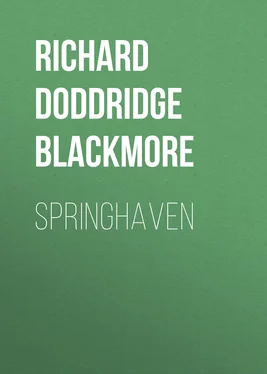Richard Doddridge Blackmore - Springhaven
Здесь есть возможность читать онлайн «Richard Doddridge Blackmore - Springhaven» — ознакомительный отрывок электронной книги совершенно бесплатно, а после прочтения отрывка купить полную версию. В некоторых случаях можно слушать аудио, скачать через торрент в формате fb2 и присутствует краткое содержание. Жанр: foreign_prose, История, foreign_edu, foreign_antique, на английском языке. Описание произведения, (предисловие) а так же отзывы посетителей доступны на портале библиотеки ЛибКат.
- Название:Springhaven
- Автор:
- Жанр:
- Год:неизвестен
- ISBN:нет данных
- Рейтинг книги:3 / 5. Голосов: 1
-
Избранное:Добавить в избранное
- Отзывы:
-
Ваша оценка:
- 60
- 1
- 2
- 3
- 4
- 5
Springhaven: краткое содержание, описание и аннотация
Предлагаем к чтению аннотацию, описание, краткое содержание или предисловие (зависит от того, что написал сам автор книги «Springhaven»). Если вы не нашли необходимую информацию о книге — напишите в комментариях, мы постараемся отыскать её.
Springhaven — читать онлайн ознакомительный отрывок
Ниже представлен текст книги, разбитый по страницам. Система сохранения места последней прочитанной страницы, позволяет с удобством читать онлайн бесплатно книгу «Springhaven», без необходимости каждый раз заново искать на чём Вы остановились. Поставьте закладку, и сможете в любой момент перейти на страницу, на которой закончили чтение.
Интервал:
Закладка:
But the sea-going folk of Springhaven had learned, by lore of generations, to build a boat with an especial sheer forward, beam far back, and deep run of stern, so that she was lively in the heaviest of weather, and strong enough to take a good thump smiling, when unable to dance over it. Yet as a little thing often makes all the difference in great things, it was very difficult for anybody to find out exactly the difference between a boat built here and a boat built ten or twenty miles off, in imitation of her. The sea, however, knew the difference in a moment between the true thing and the counterfeit, and encouraged the one to go merrily on, while it sent back the other staggering. The secret lay chiefly in a hollow curve forward of nine or ten planks upon either side, which could only be compassed by skilful use of adze and chisel, frame-saw and small tools, after choice of the very best timber, free from knots, tough, and flexible. And the best judge of these points was Zebedee Tugwell.
Not having cash enough just at present (by reason of family expenses, and the high price of bread and of everything else) to set upon the stocks the great smack of the future, which should sail round the Rosalie, Captain Tugwell was easing his mind by building a boat for stormy weather, such as they very seldom have inshore, but are likely to meet with outside the Head. As yet there were not many rowing boats here fit to go far in tumbling water, though the few that could do it did it well, and Tugwell’s intention was to beat them all, in power, and spring, and buoyancy. The fame of his meaning was spread for as much as twenty leagues along the coast; and jealous people laughed, instead of waiting for him to finish it.
Young Daniel had been well brought up in the mysteries of his father’s craft, and having a vigorous turn of wrist, as well as a true eye and quick brain, he was even outgrowing the paternal skill, with experiments against experience. He had beautiful theories of his own, and felt certain that he could prove them, if any one with cash could be brought to see their beauty. His father admitted that he had good ideas, and might try them, if any fool would find the money.
Wroth as he had been at the sharp rebuff and contumely of his father, young Daniel, after a long strong walk, began to look at things more peaceably. The power of the land and the greatness of the sea and the goodness of the sky unangered him, and the air that came from some oyster beds, as the tide was falling, hungered him. Home he went, in good time for dinner, as the duty of a young man is; and instead of laughing when he came by, the maids of Springhaven smiled at him. This quite righted him in his own opinion, yet leaving him the benefit of the doubt which comes from a shake in that cradle lately. He made a good dinner, and shouldered his adze, with a frail of tools hanging on the neck of it, and troubled with nothing but love—which is a woe of self-infliction—whistled his way to the beach, to let all the women understand that he was not a bit ashamed. And they felt for him all the more, because he stood up for himself a little.
Doubtful rights go cheap; and so the foreshore westward of the brook being claimed by divers authorities, a tidy little cantle of it had been leased by Admiral Darling, lord of the manor, to Zebedee Tugwell, boat-builder, for the yearly provent of two and sixpence sterling. The Admiral’s man of law, Mr. Furkettle, had strongly advised, and well prepared the necessary instrument, which would grow into value by-and-by, as evidence of title. And who could serve summary process of ejectment upon an interloper in a manner so valid as Zebedee’s would be? Possession was certain as long as he lived; ousters and filibusters, in the form of railway companies and communists, were a bubble as yet in the womb of ages.
This piece of land, or sand, or rush, seemed very unlikely to be worth dispute. If seisin corporeal, user immemorial, and prescription for levance and couchance conferred any title indefeasible, then were the rabbits the owners in fee-simple, absolute, paramount, and source of pedigree. But they, while thoroughly aware of this, took very little heed to go into it, nor troubled their gentle natures much about a few yards of sand or grass, as the two-legged creatures near them did. Inasmuch as they had soft banks of herb and vivid moss to sit upon, sweet crisp grass and juicy clover for unlabored victuals—as well as a thousand other nibbles which we are too gross to understand—and for beverage not only all the abundance of the brook (whose brilliance might taste of men), but also a little spring of their own which came out of its hole like a rabbit; and then for scenery all the sea, with strange things running over it, as well as a great park of their own having countless avenues of rush, ragwort, and thistle-stump—where would they have deserved to be, if they had not been contented? Content they were, and even joyful at the proper time of day. Joyful in the morning, because the sun was come again; joyful in the middle day to see how well the world went; and in the evening merry with the tricks of their own shadows.
Quite fifteen stepping-stones stepped up—if you counted three that were made of wood—to soothe the dignity of the brook in its last fresh-water moments, rather than to gratify the dry-skin’d soles of gentlefolk. For any one, with a five-shilling pair of boots to terminate in, might skip dry-footed across the sandy purlings of the rivulet. And only when a flood came down, or the head of some springtide came up, did any but playful children tread the lichened cracks of the stepping-stones. And nobody knew this better than Horatia Dorothy Darling.
The bunnies who lived to the west of the brook had reconciled their minds entirely now to the rising of that boat among them. At first it made a noise, and scratched the sand, and creaking things came down to it; and when the moon came through its ribs in the evening, tail was the quarter to show to it. But as it went on naturally growing, seldom appearing to make much noise, unless there was a man very near it, and even then keeping him from doing any harm—outside the disturbance that he lives in—without so much as a council called, they tolerated this encroachment. Some of the bolder fathers came and sat inside to consider it, and left their compliments all round to the masters of the enterprise. And even when Daniel came to work, as he happened to do this afternoon, they carried on their own work in its highest form—that of play—upon the premises they lent him.
Though not very large, it was a lively, punctual, well-conducted, and pleasant rabbit-warren. Sudden death was avoidable on the part of most of its members, nets, ferrets, gins, and wires being alike forbidden, foxes scarcely ever seen, and even guns a rare and very memorable visitation. The headland staves the southern storm, sand-hills shevelled with long rush disarm the western fury, while inland gales from north and east leap into the clouds from the uplands. Well aware of all their bliss, and feeling worthy of it, the blameless citizens pour forth, upon a mild spring evening, to give one another the time of day, to gaze at the labors of men upon the sea, and to take the sweet leisure, the breeze, and the browse. The gray old conies of curule rank, prime senators of the sandy beach, and father of the father-land, hold a just session upon the head borough, and look like brown loaves in the distance. But these are conies of great mark and special character, full of light and leading, because they have been shot at, and understand how to avoid it henceforth. They are satisfied to chew very little bits of stuff, and particular to have no sand in it, and they hunch their round backs almost into one another, and double up their legs to keep them warm, and reflect on their friends’ gray whiskers. And one of their truest pleasures is, sitting snug at their own doors, to watch their children’s gambols.
Читать дальшеИнтервал:
Закладка:
Похожие книги на «Springhaven»
Представляем Вашему вниманию похожие книги на «Springhaven» списком для выбора. Мы отобрали схожую по названию и смыслу литературу в надежде предоставить читателям больше вариантов отыскать новые, интересные, ещё непрочитанные произведения.
Обсуждение, отзывы о книге «Springhaven» и просто собственные мнения читателей. Оставьте ваши комментарии, напишите, что Вы думаете о произведении, его смысле или главных героях. Укажите что конкретно понравилось, а что нет, и почему Вы так считаете.












